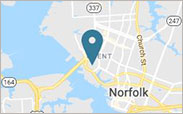We offer fellows four major types of experiences:
- Clinical: As part of the trauma team, fellows and Pediatric Emergency Medicine faculty provide 24-hour supervision in CHKD's Emergency Department.
- Teaching: Fellows teach residents and students, gaining practice in lecture design and delivery.
- Administrative: Fellows are involved with day-to-day administrative operations and participate as active members of hospital committees.
- Research: Following a first-year research boot camp, fellows design and execute one or more independent research projects suitable for publication or presentation.
Our program provides early exposure to research methodology and access to research support staff. This affords fellows the resources to successfully complete one or more scholarly projects during their training period. Fellows also receive clinical autonomy during their training which assures their ability to independently staff a high-volume pediatric emergency department immediately after graduation.
